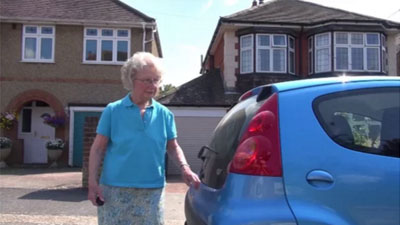How to Help
You will undoubtedly have the best interests of your relative or friend at heart, so if you feel that they are a danger to themselves and others don’t avoid having this difficult conversation. Remember, you are not the first person to be faced with this problem and others have found solutions which have worked very well.

These short films Conversations about giving up driving: three families' experiences by GEM Motoring Assist and BBC Inside Out, may also help you prepare to have this conversation.
Before having a conversation that may be premature and unnecessary (get it wrong the first time and the next time you have the discussion will be twice as difficult) try to put yourself in their shoes, and ask yourself how you would feel if someone was critical of your driving. Suggesting someone gives up driving can have dramatic implications on their mobility, independence and lifestyle.
Before talking to your relative or friend about their driving it’s helpful to think about a number of things.
Consider where and when to have the conversation. It’s vital to choose a time and location that is conducive to having a discussion on this very sensitive issue.
Discuss your concerns with other relatives or friends, who know how the person drives to see if they agree with you.

Consider their driving. If you have not already done so, go out with the driver as their passenger, so you are not just acting on second-hand reports, and consider whether any mistakes they make are occasional, isolated incidents or part of a pattern of events. Ask yourself:
- Can they physically control the vehicle (steer and brake)?
- Have they good all round vision?
- Are they alert and able to concentrate and respond efficiently to events and everything they see?
- Are they able to anticipate and react quickly to the actions of other road users?
- Can they take appropriate action when the unexpected happens?
Consider the range of options for helping them. For example, they could take a driver assessment or refresher driver training to identify whether their driving could be improved. They could adjust when and where they drive and adapt their vehicle. Even minor adaptations to the car, such as fitting auxiliary mirrors to aid all-round vision or parking sensors, can make a big difference.
Discuss these options and investigate them together, rather than simply suggest that they stop driving. For more information see the Driver Assessment and the Your Car sections of this website.
Ask them to discuss their driving with their doctor and to ask the doctor whether they should continue to drive.
Consider sharing your concerns with their doctor if the person refuses to speak to their doctor about this. Tell the person that you are going to do this. Ask their doctor to consider whether the person is safe to continue to drive, and if not, to explain to them why not, and that they have a legal duty to inform DVLA about their condition and advise them not to drive in the meantime. If the person is incapable of understanding this advice, for example because of dementia, the GP should inform DVLA immediately.
Suggest they seek a second opinion if they refuse to accept their doctor’s diagnosis, and help arrange for them to do so. Advise them not to drive in the meantime.
Try to help them understand their legal duty. Drivers must, by law, inform the DVLA about a medical condition that affects their driving and if they fail to do so they can be fined up to £1,000. If they are involved in an accident they could be prosecuted. Ultimately, the decision to stop driving is theirs, not yours - only the DVLA and GP have the power to intervene.
If they decide to voluntarily surrender their licence they should inform the DVLA using a ‘Declaration of voluntary surrender’ form which can be downloaded from Surrendering Your Driving Licence. If circumstances change, and they want to start driving again, they can Reapply for a driving licence following a medical condition. They will need to meet the legal medical standards for driving and complete a D1 medical application form. Before doing so, they should check with their doctor to make sure they can meet the medical standards for driving.
If they refuse to stop driving, and you feel that they are a danger to themselves and others you can report your concerns to the DVLA by completing the form at Report Concerns about a driver to the DVLA. The DVLA will treat this in the strictest confidence and they would never reveal to the licence holder or to anyone else, how they received the information.








